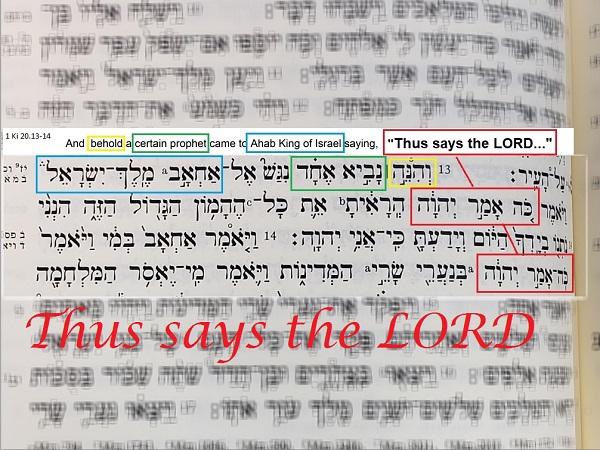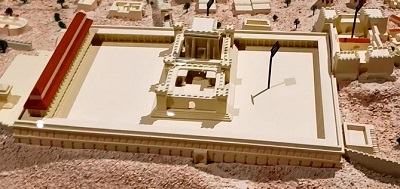An agnostic sent a question about the word of God to Creation Ministries International. CMI retweeted it here, the full question is here and is answered by CMI rep Jonathan Sarfati. Sarfati approaches it on the basis of valid, internally consistent philosophical systems. But I want to take it in a different direction and answer it evidentially. That is, is there evidence that the Bible is the word of God? So in this article we’ll to take a look at the heart of the question and address the key issue which, as the agnostic puts it, is this:
I’m not denying that the bible is an excellent book, nor that it may be the word of God, but I will question one tenet:
That the Bible must be the word of God, because it says so.
Now, consider me heretic, but it strikes me that this is a ridiculous line of thought to take? If I were to say that my face was made of cucumber, and I’m four hundred years old, would that make it so simply because I said so?
I’m not entirely convinced that it would.
The first obvious question that comes to mind is: why does the agnostic think the Bible is an excellent book if he questions it is the word of God? Sarfati addresses it via CS Lewis’ famous trilemma argument: Jesus – lunatic, liar or Lord? (If you claim to be God, either the claim is true and you are God, or the claim is false and you are either a liar or a lunatic. One must decide which it is but you cannot consider Jesus a “good” teacher, person, prophet, etc. if he is not who he claims to be.) I’ll address it by Jesus’ answer to the man who asked:
“Good teacher,” he asked, “what must I do to inherit eternal life?”
“Why do you call me good?” Jesus answered. “No one is good–except God alone.
Mark 10.17-18
Jesus is making a similar point (ahead of CS Lewis). Why do you consider Jesus to be good? Jesus says that man is sinful and thus evil (Matt 7.11) and so none are good but God alone. The implied question is: are you then considering Jesus to be God if he’s good? The young man does not answer this question.
So the question to the agnostic is this: why do you consider the Bible to be an “excellent book” if it falsely claims to be the word of God? A book that falsely claims to be the word of God is not excellent or good – it’s evil. And make no mistakes, the Bible does clearly claim to be the word of God. But we’ll get to that. Firstly, let’s outline an approach to looking at the evidence that the Bible is in fact the word of God.
The Framework: What kinds of Evidence to look for
There are three lines of inquiry that we’ll look at to evaluate the evidence that the Bible is in fact the word of God:
- The Bible’s claims about itself. Does it claim to be the word of God?
- Does the Bible appear to have supernatural origins? If so, what would you expect from a book that claims to be from God? Is it a book only God could produce?
In this section we’ll look to see if the Bible exhibits supernatural qualities befitting a God outside of space and time. Things such as:
– A. How the Bible was composed
– B. Knowledge revealed beyond that of the time
– C. Prophecies
And finally we’ll look at: - Recognition as the Word of God
Red Herrings and False Analogies
Before we get started, let’s eliminate the red herring he throws out to poison the well.
Consider his statement that the Bible’s claim to be the word of God is as ridiculous as if he claimed “my face was made of cucumber” and the thing that made the statement true is simply because he said so. That is both a red herring and a false analogy. It is true that the Bible is the word of God. But claiming that it is true because “the Bible says so” is the red herring. Suppose I state, “look in my garage, behold the car!” Notice my claim: an object in my garage is a what I’m claiming is a car. Here’s the key point: if I truly have a car in my garage, my statement that it’s a car does not make it a car – it’s already a car. The statement simply reveals what it is to you. Likewise, the word of God is just that: words that originated from God. They do not become the word of God because someone says so. They already are, by their nature, the word God. Statements that they are the word of God is to reveal that fact to those who hear them, not to make false claims about statements and words not spoken by God.
Do you see the reversal of the logical flow? It is true that the Bible is the word of God, consequently statements made in the Bible confirm that fact for the reader. It is a fundamental misunderstanding to believe that recorded words become the word of God simply because of a claim made by someone. Thus his suggestion that revealed truth is really nothing more than a bait and switch tactic is a red herring. The real question is this: is it possible to determine that what has been claimed as revealed truth is in fact revealed truth? Thus our examination of the evidence. Also, his outlandish comparison involving his face is a false analogy. The inconsequential, easily disproved proposition about his face and cucumbers in no way compares to the many, substantial, historically verifiable truths conveyed by the Bible. So the real question is: can the revealed truth of the Bible be demonstrated to be the revealed truth of a supernatural God? Using the above framework it can, so let’s get to it.
The Evidence: The Bible Is the Word of God
1. The Bible’s claims about itself
The Bible claims to be the word of God more than 1,400 times. These claims are made in statements such as “This is what the LORD says” where “LORD“, when written with small capitals is the covenant name of God, usually written as the tetragrammaton: יהוה (YHWH). That appears at least 547 times. Also there’s “God said” 587 times and “The word of the Lord (יהוה) to…” 312 times. With just those three phrases there are 1446 attributions to God (an interesting number because 1446 BC is the year of the Exodus). There are variations I haven’t included and I haven’t included all the statement of Jesus (who is God, but that needs to be proved to some people). So, conservatively speaking, there are over 1,400 claims in the Bible that what’s presented in the Bible is the word of God. Here is where the point on being a “good” or “excellent” book is critical. If the Bible is not the word of God, then it’s a deceptive forgery and cannot be considered “good” or “excellent.” But, aside from the attestations to being the word of God, we have the following evidences.
2. Does the Bible appear to have supernatural origins? Is it a book that only God could produce?
Let’s look at evidence that there is a supernatural author behind the Bible
A. The unified, detailed and foretold story of redemption
Consider these facts about the Bible:
“The Bible contains 66 books, written by 40 authors, covering a period of approximately 1600 years.”[1]
Yet
“The Bible is one book, one history, one story: His story. Behind 10,000 events stands God, the builder of history, the maker of the ages.[2]
As Mears points out, though the Bible uses 40 different authors and spans a period of 1,600 years, it tells one consistent story: The revelation of God’s creation of man and God’s salvation of man despite man’s rebellion against Him. And despite the fact that the Bible spans 1600 years, it still tells a single consistent story. I submit such a grand story could not have been conceived of, much less carried out as predicted to completion by man, particularly in the exquisite details as evidenced by the Bible and the many prophecies it made – many of which have been already fulfilled. It takes an omnipotent God, beyond space and time, working behind the scenes of His creation to bring about His will to redeem fallen man in the exact method he foretold it would happen. Prophecies, particularly of the messiah, are a key part of confirming the unity and supernatural aspect so we will take a closer look at that aspect below.
B. Knowledge Revealed that was unknown to the people of the time
Skeptics commonly make the claim that the Bible is an ancient book written by equally ancient people who were too ignorant, stupid and superstitious to produce any useful knowledge. How then does the Bible manage to contain information that in many cases was not understood until modern science discovered what the Bible had already written about? Some examples follow.
Ocean currents: Matthew Fontaine Maury, oceanographer, nicknamed “the pathfinder of the seas”, was the first to describe the Gulf Stream and mark sea routes across the Atlantic. What was his inspiration? It was Psalm 8 which talks about fish that swim in “the paths of the seas” (Ps 8.8) which inspired him to go look for the undersea paths.
Immune resistance: Israelites were instructed to circumcise males on the eighth day (Gen 17.12). Why the eighth day? Modern medicine reveals what the Israelites would not have known:
“If vitamin K is not present when a baby boy is circumcised, the baby will bleed to death. The reason why Yahweh established Day Eight for circumcision is that vitamin K peaks in a newborn at 8 days of age. The 8th day is the optimum day for circumcision because of the highest presence of the clotting factor vitamin K.”[3]
The Water Cycle: Described in the Bible
The water cycle was revealed in one of the earliest books – Job 36:27-28.
We are continually told the Bible was written by ancient (by which they mean ignorant) people who didn’t know much and lived on superstition. How could they know about the water cycle?
C. Prophetic Confirmation
Prophecy – particularly fulfilled prophecy – uniquely identifies the origin of the Bible as from God since only a supernatural, omniscient, omnipotent God, outside of time who sees all of time – past present and future and who controls all events could utter prophecies with the unique accuracy of the Bible and make them come true. The Bible sets the highest bar for itself concerning prophecy: 100%. Every single prophecy must come true for it to be considered a word from the Lord. (Deut 18.22). Prophecies of the Messiah, and unexpected non-messianic prophecies work together to confirm and mark the Bible with the seal of authenticity with regard to divine authorship. So we’ll look at both, though we’ll focus a bit more on messianic prophecy since the correct identification of Jesus is the most critical identification every person can make.
The Rise and Fall of Kingdoms
Skeptics claim that the Bible is not the word of God, it’s just a collection of stories and myths written by ancient and superstitious people. How then can the Bible accurately predict the rise and fall of Kingdoms – a number of which don’t exist at the time of the prophecy? In Daniel chapter 2, via the image of the great statue, the Bible predicts the fall of the then existing Babylonian empire followed by the rise and fall of the Medo-Persian empire, the rise of Greek empire (led by Alexander the Great) and its fall, followed by the rise and fall of the Holy Roman Empire, then the kingdom of the last days – that of the of the Beast (Rev 13), which appear to be forming now. And finally the last kingdom – the Kingdom of God. In this prophecy though its history has proved it true, since names are not given, it is easy for unbelievers to doubt the Bible was speaking of those specific kingdoms. So let let me provide examples where the fall of kingdoms are named by name.
The Fall of Assyria and Babylon
Assyria and Babylon were great and powerful kingdoms in the ancient near east that the people of God had to deal with through much of the Old Testament period. It seems God allowed these vast and great empires to grow, exist and challenge the people of God to see if his people would trust in him, or doubt him and instead appeal to the comparatively weak power of pagan kings with great armies like Egypt. But those kingdoms were wicked, and God eventually calls for, and predicts their end. For the skeptics, note that the Bible names the kingdoms by name, gets the order of their reign (along with their kings) correct, and also correctly predicts their fall and destruction. Is that all lucky guesses? Coincidences?
The Fall of Assyria
The Assyrian empire dominated the landscape of the biblical lands from approximately 858 BC with the rule of Shalmaneser III to about 605 – when Nebuchadnezzar over took them and began his reign over Babylon. Isaiah prophesied from 740 to 680 BC – well before the fall of the Assyrian empire. Yet he prophesied this about Assyria:
“Assyria will fall by a sword that is not of man; a sword, not of mortals, will devour them. They will flee before the sword
and their young men will be put to forced labor.
Their stronghold will fall because of terror; at sight of the battle standard their commanders will panic,” declares the LORD, whose
fire is in Zion, whose furnace is in Jerusalem.
Isaiah 31.8-9
Sennacherib was one of the more famous rulers of the Assyrian empire since he’s mentioned in the Bible. Perhaps his most memorable event is his attempt to take Jerusalem. With his power and might he thought it would be easy to take the little kingdom of Judah, but he was repelled by God himself, who killed 185,000 of his soldiers, forcing Sennacherib to withdraw. That was such a spectacular miracle it is repeated three times in the bible – in Kings, Chronicles and Isaiah. (2 Ki 19.9-36; 2 Chr 32.10- 22; Isaiah 37:9-37). I mention it because in the video below, you can see what’s left of part of his kingdom – one of the capital cities of the ancestors of Sennacherib – the city of Nimrud, under the dirt of Iraq that now covers it. In the video you can see it was once a great city, but has been destroyed – just as the Bible predicted.

Anthropologist Jason Ur describes the ruins of Nimrud, a former Assyrian capital City [4]
Perhaps even more surprising than the fall of the Assyrian empire is the fall of the great kingdom of Babylon. The Babylonian empire in its day, like Assyria, was the super power of the world. Between its military might and its magnificent buildings (the Ishtar gate, the hanging gardens, the walls of the city) it was truly the greatest world power having conquered many other Kingdoms. It was through the Babylonians that God brought judgment on his rebellious people of the southern kingdom of Judah. (God used Assyrian to judge the northern kingdom of Israel). And it was the Babylonians who captured the city of Jerusalem c. 587-586 and carried the Israelites including the prophet Daniel into captivity. (Daniel 1.1-6) Great power leads many into arrogance and deceit as it did many Babylonians – including her great king Nebuchadnezzar, whose arrogance God famously corrected by first driving him mad, then restoring him. (Dan 4.27ff) Having conquered so many kingdoms, even the people of the God of Israel, you can imagine that the Babylonians thought they were invincible. Yet because of their idolatry and wickedness, God pronounced judgment against them in the days of Isaiah (740-680 BC) and Jeremiah (626 – 585 BC) and claimed the city would fall (Jer 51.8-9, 37; Is 13.19-22) and the walls would be destroyed. (Jer 51.58) I’m sure many Babylonians would have laughed at such a prophecy, feeling secure in Babylon’s power much like many Americans today can not conceive of or consider the fall of America, though that too appears certain. Yet, as the Lord prophesied, Babylon fell, and it’s walls were destroyed. As evidence, I ask this question: who rebuilds a city that is standing? No one rebuilds cities unless they are first destroyed, even if like Nero, it is you yourself who destroyed the city. It is now known that Saddam Hussein (yes the one suspected of having WMDs) was quietly going about the business of re-building the kingdom of Babylon. You can read reports of it here and here. Why rebuild that which is not destroyed? Hussein began massive building projects because Babylon had been destroyed.
The Fall of the Second Temple in Jerusalem
The first temple, the one built by King Solomon was destroyed by the Babylonian king Nebuchadnezzar. (2 Chr 36.17-19) The Second Temple, initially very humble even after the ministry of Haggai to build it up and restore it (Haggai 1.1ff), was small compared to the magnificent temple build by King Solomon. Later, Herod the Great, master builder and King of Judea under the authority of Rome, greatly extended and enhanced the temple during his reign to such an extent that people marveled at its beauty (Luke 21.5). It too was magnificent but to the astonishment of his disciples, Jesus prophesied that the temple would be destroyed (Luke 21.6). This prophecy was fulfilled when the soon-to-be emperor Titus and his army besieged Jerusalem (in fulfillment of prophecy of Luke 19.43-44) and killed many Jews and destroyed the temple. He was later crowned emperor of Rome. These events were witnessed and recorded by the Jewish historian Josephus in his history “The War of the Jews.” Below, a model of the temple mount as it was in Jesus’ day, and below that, as it is today, with the temple gone and the Islamic dome of the rock build where the temple should be. Why did God allow that? “…because you did not recognize the time of God’s coming to you” Jesus said. (Luke 19.41-44)
Prophecies of the coming of the messiah
There are many, many prophecies of the coming of the Messiah so I will list only a few of them here. It’s not uncommon for sources referring to the prophecies of the Messiah to suggest you look them up yourself. I’ll take it a small step further and give you a few resources that list prophecies of the messiah in the footnote. [5] For those interested, they present a good view of the many prophecies of the Messiah. But, for starters, following are just a few of the many prophecies made concerning the Messiah and the fulfillment by Jesus of Nazareth.
Messiah: Heir to the throne of David:
Prophesied: Is 9.7; Fulfillment Recorded: Matt 1.1
Messiah: Born of a virgin
Prophesied: Is 7.14; Fulfillment Recorded: Matt 1.18, Luke
Messiah: Born in Bethlehem
Prophesied: Micah 5.2; Fulfillment Recorded: Matt 2.1
Messiah: Pierced as in a crucifixion...
Prophesied: Ps 22.16; Fulfillment Recorded: Matt 27.35, John 20.27
… But not a bone broken
Prophesied: Ps 34.20; Fulfillment Recorded: John 19.33
Messiah: To die and rise again
Prophesied: John 2.19 Fulfillment Recorded: Mark 16.9
3. Recognition as the Word of God
Perhaps the best testimony about the authenticity of the Bible after prophecy is the fact that it is both the best selling book of all time and the most translated book of all time. This is clearly a recognition that there is something special about this book. But how can a book, that was completed about 2,000 years ago and written by a collection of ancient people whose occupations ranged from shepherd to king to physician, become so popular and long lasting? How could they have weaved together a single story over 1600 years? How could they have so accurately made predictions that they themselves or others saw fulfilled? How could they have knowledge of science unknown at the time? The most reasonable explanation is that the Bible is indeed the word of God.
Conclusion
Again it is clear that, once the facts are revealed, statements like, “the Bible is the word of God merely because it or some person says so” are born of ignorance, or a desire to deny the authority of the Bible over every person – or both. Just as there is ample evidence of the existence of God for those who care to look (Ps 19.1), there is ample evidence that the Bible is the word of God, for those who care to look.
“As for God, his way is perfect; the word of the LORD is flawless. He is a shield for all who take refuge in him.”
2 Sam 22.31
As Jesus was saying these things, a woman in the crowd called out, “Blessed is the mother who gave you birth and nursed you.”
He replied, “Blessed rather are those who hear the word of God and obey it.”
Luke 11.27-28
Duane Caldwell | January 28, 2023 | Printer Friendly Version
Follow @rational_faith_
Notes
1. Henrietta C. Mears, What the Bible is All About, Ventura, Ca: Regal Books, 1983, p.13
Back
2. Mears, p.20
Back
3. “Scientific Evidence For Circumcision On The Eighth Day” Evidence for the Bible, accessed 1/16/23
https://evidence-for-the-bible.com/scientific-evidence-for-the-bible/scientific-evidence-for-circumcision-on-the-eighth-day/
Back
4. Jason Ur – ref from Secrets Of The Dead Ep. “The Lost Gardens Of Babylon” PBS documentary, 2014
Back
5. A few books to view some of the many prophecies of the Messiah:
The Thompson Chain Reference Bible, Grand Rapids MI: Zondervan Corp and Indianapolis, IN: BB Kirkbride Bible Co Inc, 1983, pp 1567-1570
Jonathan Bernis, A Rabbi Looks at Jesus of Nazareth, Grand Rapids MI: Chosen Books, 2011, pp141 -162
Josh McDowell, Evidence That Demands a Verdict, Vol 1, San Bernardino, CA:Here’s Life Publishers, Inc., 1989,pp144-176
Image:
Biblia Hebraica, 1 Kings 20:13-14, Photo by Duane Caldwell



